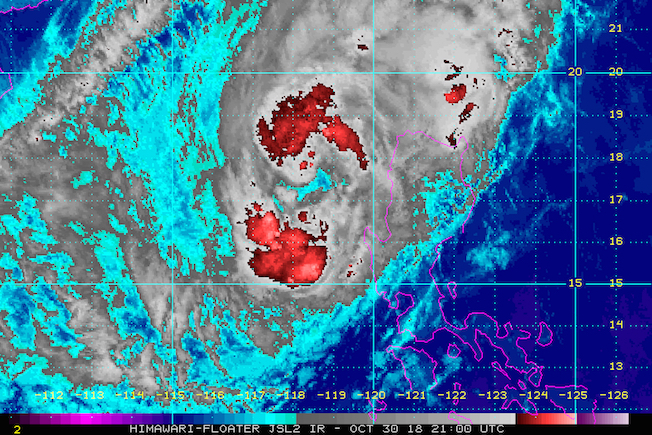
[ad_1]
But there will still be light to moderate rain in parts of Luzon, as Severe Tropical Storm Rosita (Yutu) is hardly moving over the West Philippine Sea
What’s the weather like in your area? Report the situation through Rappler’s Agos or tweet us at @rapplerdotcom.

Satellite image of Severe Tropical Storm Rosita (Yutu) as of October 31, 2018, 5 am. Image from NOAA
MANILA, Philippines – There are no more areas under tropical cyclone warning signals due to Severe Tropical Storm Rosita (Yutu), but there will still be light to moderate rain in parts of Luzon.
In a bulletin issued 5 am on Wednesday, October 31, the Philippine Atmospheric, Geophysical, and Astronomical Services Administration (PAGASA) said Rosita is already 210 kilometers northwest of Dagupan City, Pangasinan. It is almost stationary or hardly moving in that spot in the West Philippine Sea.
Rosita also weakened further before dawn. It now has maximum winds of 100 km/h from the previous 110 km/h and gustiness of up to 120 km/h from the previous 135 km/h. (READ: FAST FACTS: Tropical cyclones, rainfall advisories)
PAGASA said the trough or extension of Rosita will still bring light to moderate rain to Northern Luzon and Central Luzon on Wednesday. Flash floods and landslides remain possible, so residents should stay on alert, especially if they live near rivers, in low-lying areas, or in mountainous areas.
In Mountain Province, at least 4 people were killed in a landslide that buried a local office of the Department of Public Works and Highways. A 5-year-old girl was also reported dead in a landslide in Kalinga.
Residents of some coastal areas and landslide-prone areas earlier evacuated ahead of Rosita’s landfall. (READ: Cagayan braces for Typhoon Rosita a month after Ompong)
Rosita made landfall in Dinapigue, Isabela, as a typhoon at 4 am on Tuesday, October 30. There was serious damage in the province. (IN PHOTOS: Typhoon Rosita’s onslaught in Isabela)
After hitting Isabela, Rosita crossed Nueva Vizcaya, Benguet, and La Union. It then left landmass through La Union at 2 pm on Tuesday. (READ: Clearing operations ongoing in typhoon-hit Isabela)
It only weakened into a severe tropical storm early Tuesday evening.
Sea travel remains risky in the seaboards of Northern Luzon and in the western seaboards of Central Luzon and Southern Luzon.
A gale warning was issued at 5 am on Wednesday for Batanes, the Babuyan Group of Islands, Calayan, the northern and eastern coasts of Cagayan, Ilocos Norte, Ilocos Sur, Occidental Mindoro, the western coast of northern Palawan, Isabela, La Union, Pangasinan, Zambales, and Bataan.
Seas off those areas are rough to very rough, with wave heights reaching 2.8 meters to 4.5 meters.
PAGASA advised fishermen and others with small vessels not to set sail in areas covered by the gale warning. Larger vessels should watch out for big waves.
Classes also remain suspended in some areas on Wednesday. (READ: #WalangPasok: Class suspensions, Wednesday, October 31)
Based on Rosita’s latest forecast track, it will leave the Philippine Area of Responsibility on Wednesday afternoon.

Forecast track of Severe Tropical Storm Rosita (Yutu) as of October 31, 2018, 5 am. Image from PAGASA
Rosita is the Philippines’ 18th tropical cyclone for 2018. The country usually gets an average of 20 tropical cyclones per year. (READ: LIST: PAGASA’s names for tropical cyclones in 2018)
PAGASA said it does not expect any tropical cyclone to immediately follow Rosita, at least in the next 2 to 3 days.
PAGASA declared the start of the rainy season last June 8. – Rappler.com
[ad_2]
Source link